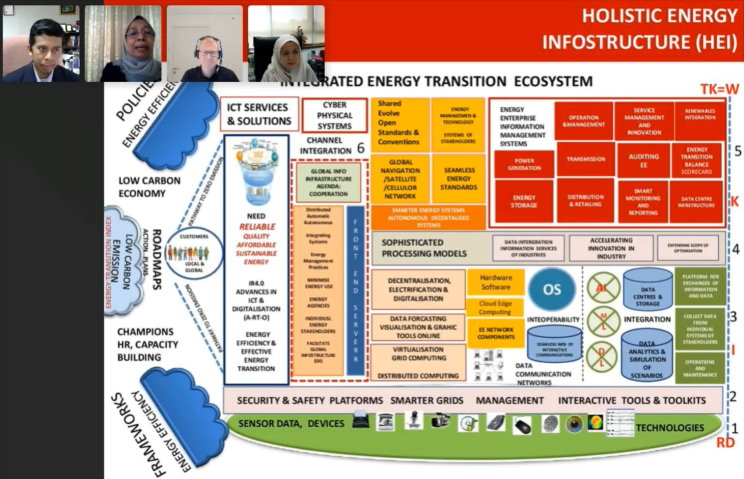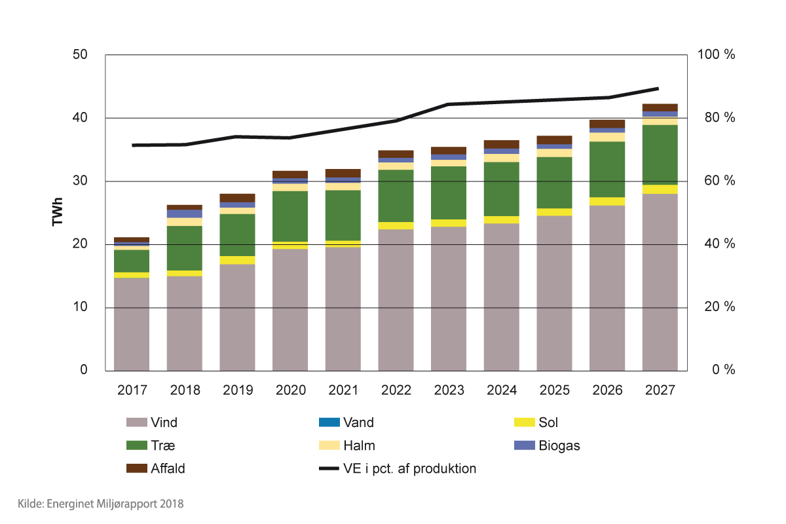
On 8th December 2020, IICE has successfully organised the first of our webinar series with the above title. With the objective to understand and appreciate the role that ICT has been and will be playing in energy transition, the webinar, which was moderated by yours truly, had lined up the best of speakers to discuss on the topic - Professor Dato' Dr. Halimah Badioze Zaman (Principal research fellow, IICE, UNITEN), Professor Bo Nørregaard Jørgensen (Head of Center for Energy Informatics, SDU) and Professor Ts. Dr. Salman Yussof (Senior research fellow/Professor, IICE). The role of ICT in energy transition was deliberated from various angles during the discussion. It started with introducing energy transition, concerns over climate change, the aim to attain net zero green house gas (GHG) emissions by 2050 and the role of ICT in addressing all of these, which was the main agenda of the webinar.
Prof. Halimah kicked off the first round by highlighting the importance of a holistic energy infostructure to support energy transition. In a very comprehensive (I mean it) integrated energy transition ecosystem, she explained the six dimensions or layers that constitute the framework beginning with the first layer that deals with the raw data (RD) to the sixth layer that is giving us the tacit knowledge (TK) or wisdom (W). In the process, we gain information (I) and knowledge (K) respectively. She also emphasised on the need for capacity building programmes to ensure successful execution of the framework.

Prof. Bo kept the ball rolling by explaining about the enabling information and communication technologies for energy transition covering digitisation, digitalisation and digital transformation phases, which aimed to address the question of 'How can the digital transformation of the energy sector help us to solve the climate change challenge by transforming the energy system from fossil fuels to renewable energy source?' Using Danish successful energy transition as example, he started by mentioning the importance of policies in pushing the transition to happen. With the increasing number of renewable energy sources in the forms of farm and distributed energy resource (DER), contribution from renewables currently stands at slightly more than 60% and the aim is to reach more than 80% by the year 2027. The last mile of reaching 100%, according to Prof. Bo, is going to be the greatest challenge as it is beyond what the conventional technologies can do and this is where ICT's role is very much needed. In a similar tone to what Prof. Halimah concluded earlier, more knowledge and more education for the engineers and decision makers are the way forward to successful energy transition.

Prof. Salman then continued with the presentation on the research areas in ICT for energy transition, which can be broadly divided into renewable energy and energy efficiency, and the list of relevant research projects that are currently being conducted at IICE, which can also be found here. IICE strategic research roadmap for the next five years was also shared.
Following this first round of presentations from the speakers were two rounds of discussion on the importance of supporting policies and research collaborations between academia and service providers to ensure successful energy transition, concerns over cybersecurity issues with the increasing penetration of ICT into the energy systems and lessons learnt from the successful energy transition in Denmark. Questions from the audience were also answered by the speakers in the final round. Below are some salient takeaways from the discussion.
a) Readiness in all aspects and by all stakeholders is very important to drive the initiatives towards successful energy transition. This includes in terms of technology, economy, political (decision makers) and financial. Furthermore, in pursuing energy transition and achieving net zero by 2050, we can't totally ignore the fact that some 1.7 billion of the world population around the world, mostly in Africa and Asia, are still without electricity and 2.7 billion without cooking fuels. For these countries, access to energy, in whatever forms, is the main goal and clean energy or energy transition is perhaps not on the agenda yet. However, there is hope in the wonders that the technologies can bring. Just like we wouldn't have imagined to have what we have today 40 years back, 30 years down the line towards 2050 will be filled with inventions and innovations that will help to realise the target. Therefore, despite the different schools of thought on achieving net zero by 2050, Prof. Halimah is at least optimist that every country will eventually get there, albeit at different pace.
b) In the pursuit towards successful energy transition, the 'cost of success' needs to be factored in. A quote from my lecturer during my degree time that I still vividly remember until today, "You don't get something for nothing." Denmark's successful transition towards renewable energy is partly (perhaps largely) attributed to the large amount of research funding through various research programmes by the government, coupled with the appropriate incentives that also help to finance the research activities. Furthermore, the funding is given to consortiums that are made up of technology providers, research institutions and end users to ensure that the research outcomes meet end users needs. This is one of the driving factors that help the country to get to where it is today, according to Prof. Bo.
c) In conclusion, two important drivers of successful energy transition are highlighted; policy and incentive. To be effective, every move towards greener growth should either be forced by regulation or motivated by incentive. For example, on Denmark's successful decoupling of the GHG emissions and economy growth, there is this incentive where industries can 'sell' their energy savings, and this of course must have been clearly stated somewhere the policy. Coming back to Malaysia, it is hoped that a dedicated section on energy transition will be included in the National Energy Policy that is currently being revised by the Economic Planning Unit (EPU) under the Prime Minister's Department. With regards to this, the following five areas are proposed to be included under the energy transition section; renewable energy and electricity market platform, energy building construction transition platform, energy efficiency and inclusivity platform, holistic energy infostructure, smart grid and metering platform, and energy education, research development and innovation platform.
"The last mile of reaching 100% sources of renewable energy is going to be the greatest challenge as it is beyond what the conventional technologies can do and this is where ICT's role is very much needed."
All in all, I am most astonished (and jealous) to learn that by law, researchers in Denmark have access to the enormous and valuable data collected from various means for research purposes. Local data need to be available for research, or at least regional data. Relying on global datasets will limit the applicability of the research outcomes. This, I believe, is something that we have to seriously think about. Perhaps to begin with by having an open data policy for the energy sector.
With more than 100 people registering, we hoped that the webinar has managed to reach its intended audience and that the content of the discussion has met their expectations. At least we can see the latter from the text messages sent to the chat room of the webinar and to me personally after the webinar, some of which are shared below. You can watch the full recording of the webinar here.
"Congrats Leen. I think you did really well for the webinar. So proud of you and IICE team."
"Good job Leen. Well organised and very good info shared."
"Thank you for great insights and presentation by the panels and the organizer, IICE. Great session!"
Yours truly,
Hazleen Aris
August 16th, 2021
Designed with
Landing Page Builder